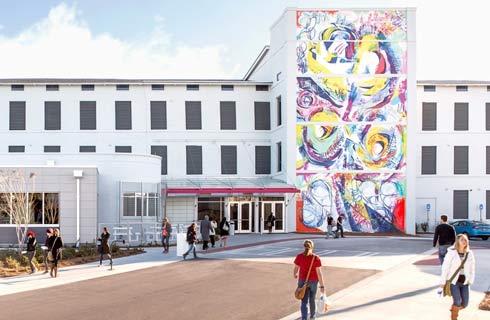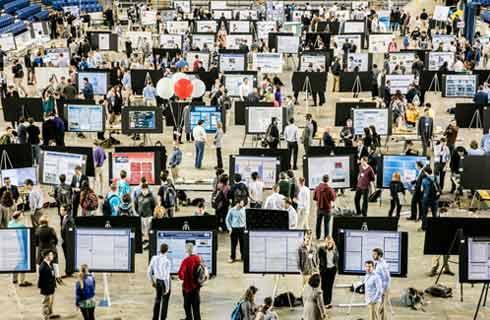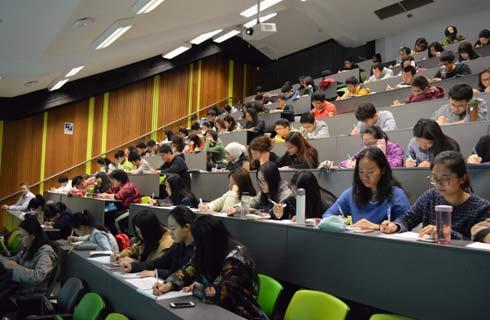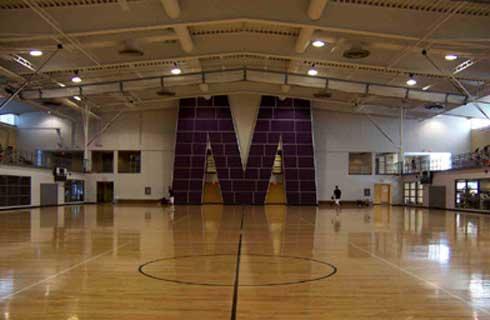Bachelor of Science in Civil Engineering - Transportation Engineering

学历文凭
Bachelor Degree

专业院系
交通与公路工程

开学时间

课程时长

课程学费

国际学生入学条件
High School Transcripts.
Typically, the most important factor in the admission evaluation process is demonstrated academic achievement in a challenging secondary school program.
The admission committee looks for applicants who have completed the most rigorous academic courses available in their secondary schools and recommends that prospective students should exceed minimum high school graduation requirements. We require an official transcript. The secondary program should include no fewer than 16 academic courses and must include the following courses:
English 4 units
Mathematics 4 units
Foreign Language 2 units
Science (from among biology, chemistry, and physics) 2 units (*)
Social Studies 1 unit
A TOEFL or IELTS score should not be more than two years old. Depending on the school, most admitted graduate students attain a minimum total score of 90 on the internet-based (iBT) TOEFL (including sectional minimums of 22 in speaking, 22 in writing, 23 in reading and 23 in listening). The minimum paper-based TOEFL score requirement is usually 600, and the minimum IELTS score requirement is 7.0.
IDP—雅思考试联合主办方

雅思考试总分
7.0
了解更多
- 雅思总分:7
- 托福网考总分:90
- 托福笔试总分:600
- 其他语言考试:NA
CRICOS代码:
申请截止日期:请 与IDP联系 以获取详细信息。
课程简介
Transportation engineering involves the planning, design, construction, operation, and maintenance of large-scale transportation facilities such as highways, airports, railroads, harbors, pipelines, and public transit systems. The civil engineer designs, builds and manages the infrastructure that provides for movement of both people and freight.<br>At the University of Virginia, undergraduate courses in transportation engineering focus on geometric design, pavement design, road user and vehicle characteristics, traffic studies and urban transportation planning. Computer methods are introduced and applied in many transportation applications. Complementary courses include probability and statistics and systems engineering courses. This transportation curriculum provides an excellent introduction to the methodology of transportation systems analysis and design.<br>The field of transportation engineering is comprised of two main streams of development: technology and planning. Technology is critical to the understanding of the function of the system, in predicting its performance and its costs, and in identifying alternatives in the form of fixed plant investments as well as operational changes. Planning methods are critical to long range plans and short-term system management problems, such as energy shortages and air pollution. The opportunities in transportation engineering appear to be excellent in the future. Graduates may be employed by governmental agencies, private companies, railroads, shippers, or transportation consultants. The transportation program at the University of Virginia is a flexible one that will prepare the student for a wide choice of careers. Civil Engineering is the broadest of all engineering professions and encompasses the application of science and technology to the planning, design, analysis, construction, operation and maintenance of the infrastructure and natural environment. Civil engineers are the fabricators of modern society and the protectors of our environment. Civil engineering program emphasizes the complex interrelationships between infrastructure, social systems, and the environment. We develop civil engineers who will seek to sustainably and equitably design, management, and construct infrastructure systems, and who are prepared to innovate with new materials and create and use digital and virtual technologies. Civil infrastructure is diverse, including many subsystems such as stormwater and drinking water systems, waste management systems, neighborhoods, highways, railways, high-rise buildings, and bridges. We develop the insight to anticipate how changes in one subsystem may affect the others and ultimately the environment, energy systems, communities, and the quality of life.
相关申请

预科

奖学金

实习机会

在校学习

跨境学习

校园授课-线上开始

在线/远程学习
学校排名
世界排名
107
数据源:泰晤士高等教育世界大学排名
关于弗吉尼亚大学

弗吉尼亚大学是全美国最知名公立大学之一当200多年前,美国第三任总统托马斯.杰佛逊创办UVA时,他的心愿是将学校办成一所国家级的公立大学。如今他的愿望已然实现,根据US News的排名,UVA是两所全美最好的公立大学之一。24000名学生正在12个学院追逐他们的学术梦想。UVA要求文理学院和商学院的学生在毕业之前掌握一门外语,文理学院的学生还必须参加英语写作、人文和艺术、社会科学、自然科学和数学、非西方研究和作文的课程。非常有能力的学生可以得到Echols Scholars项目的录取,这个项目给予200名顶尖的新生机会去寻求学术探索,而不需要受专业领域要求限制。
本校相关课程
Doctor of Juridical Science

学历文凭
Ph.D.
下一个开始日期
课程费用总额
Juris Doctor

学历文凭
Juris Doctor
下一个开始日期
课程费用总额
Juris Doctor/Master of Arts in Philosophy

学历文凭
Combined Graduate / Doctoral Degree
下一个开始日期
课程费用总额
Juris Doctor/Master of Arts in History

学历文凭
Combined Graduate / Doctoral Degree
下一个开始日期
课程费用总额
Juris Doctor/Master of Arts in Government

学历文凭
Combined Graduate / Doctoral Degree
下一个开始日期
课程费用总额
Juris Doctor/Master of Arts in English

学历文凭
Combined Graduate / Doctoral Degree
下一个开始日期
课程费用总额
其他相关课程
土木工程应用科学硕士-交通运输工程

不列颠哥伦比亚大学
泰晤士高等教育世界大学排名:

学历文凭
Masters Degree
下一个开始日期
课程费用总额
土木工程学硕士-运输工程

不列颠哥伦比亚大学
泰晤士高等教育世界大学排名:

学历文凭
Masters Degree
下一个开始日期
课程费用总额
Master of Engineering in Civil Engineering (Thesis-based) - Transportation Engineering

卡尔加里大学
泰晤士高等教育世界大学排名:

学历文凭
Masters Degree
下一个开始日期
课程费用总额
Master of Science in Civil Engineering - Transportation Engineering (Thesis Based)

卡尔加里大学
泰晤士高等教育世界大学排名:

学历文凭
Masters Degree
下一个开始日期
课程费用总额






